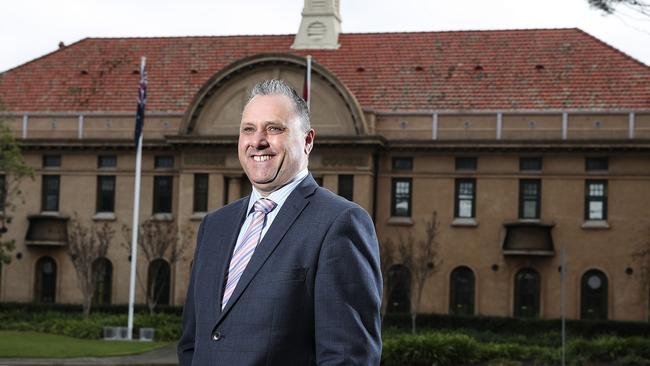Burnside Council’s corporate credit card abuse exposed in damning report by Ombudsman Wayne Lines
Boozy lunches and 3am trips to McDonald’s paid for by ratepayers – a damning report has exposed rampant credit card abuse by Burnside Council senior managers.

SA News
Don't miss out on the headlines from SA News. Followed categories will be added to My News.
Burnside Council managers used corporate credit cards to spend tens of thousands of dollars on alcohol-fuelled lunches and late-night drinking sessions, an official investigation has found.
State Ombudsman Wayne Lines has determined the council was guilty of maladministration for allowing at least $34,000 of ratepayers’ money to be spent on meals, alcohol, coffee and travel for employees without authorisation.
In a damning 82-page report, Mr Lines has recommended 13 changes to the council’s credit card management should be implemented by chief executive Chris Cowley.
Mr Cowley replaced former chief executive Paul Deb after he was sacked by the council last year amid a raft of allegations, including the misuse of credit cards.
Mr Deb is taking legal action in the Supreme Court for unfair dismissal, disputing claims including that he was intoxicated at executive meetings, swore at councillors and ordered a colleague to conceal credit card receipts.
Mr Lines launched his investigation into 466 incidents of credit card spending by eight unidentified council managers following a complaint lodged by a former elected member.
His report details numerous transactions, including lengthy drinking sessions, one of which ended with McDonald’s meals on Hindley St in the early hours of a weekday morning.
Mr Lines also lists various incidents where credit cards were used by council employees for taxis and Uber rides late at night.
Mr Lines found numerous receipts were missing while claims for expenses often lacked detail about who received the food and alcohol.
“My investigation counted at least 100 transactions under $100 that did not include an itemised receipt of what was purchased,” he said.
“Out of a total of $35,440 of transactions that were reviewed, $5766 worth of transactions did not include an itemised receipt.”
Mr Lines said it was “particularly concerning” that there were “significant purchases of alcohol with council funds”.
“The information suggests that council employees and elected members have more broadly benefited from council credit card expenditure without this expenditure being justified or adequately documented,” he said.
Mr Lines said the spending suggests “a general culture or practice of purchasing meals and alcohol for internal council meetings, luncheons, dinners and functions.”
“The transactions have led to a highly significant amount of money being spent by the council to the benefit of its own employees and elected members, without adequate justification,” he said.
“It suggests an overall trend for the period between 2015 and 2017 of a disregard for public monies being spent.”
Mr Lines said he did not consider spending ratepayers’ money on meals and alcohol “to be a standard part of doing council business”.
“I consider that the use of a council credit card for the purchase of alcohol should only occur in very exceptional circumstances,” he said.
“It became apparent that the issues concerning credit card expenditure suggested a broad culture of charging food, beverages and alcohol to council credit cards as part of the council’s normal business practice.”
Mr Lines said he was “concerned” there “did not appear to be scrutiny of those purchases, nor a reflection of whether it was necessary to use council funds for such expenditure”.
He had been unable to find a council policy of what constituted legitimate spending on entertainment or hospitality during his investigation.
“It appeared that a culture of misspending may have been facilitated by a lack of adequate record-keeping and internal policies to provide guidance as to what constituted appropriate expenditure,” he said.
“On its face, the expenditure is not at all consistent with the genuine conduct of council business but instead appears to have been expenditure for purely social reasons.”
Mr Lines said the council’s former credit card policy “provided little-to-no guidance on what constituted an appropriate credit card transaction”.
“There appeared to be an overall practice wherein a number of transaction and record-keeping errors occurred over a period of time, which suggested a broader practice of disordered record-keeping and reconciliation,” he said.
“This appears to have occurred at many levels, by the cardholder, their authorising officer and the finance team.”

Mr Lines said many of the credit card transactions involved staff planning days, workshops, meetings between managers and elected members or external stakeholder.
“It is inconceivable to me that a public agency responsible for local government would consider it acceptable to consume alcohol during staff work and planning sessions, let alone use corporate credit cards to purchase alcohol for such circumstances,” he said.
“I consider the practice of purchasing alcohol for council employees in relation to a business event or during business hours to be highly inappropriate.”
Mr Lines said one series of transactions involved 10 council employees attending an awards night before several continued drinking until 3am the next day.
“The expenditure appeared to continue well after the duration of the event itself into the early hours,” he said.
“Overall, the transactions give the impression that the council was simply funding a ‘boozy night out’ for a small number of senior employees. It is difficult to see how such expenditure could ever be justified.”

Mr Cowley, the new CEO, said he already had implemented a wide-ranging overhaul of how Burnside Council managed its corporate credit cards.
He said it was in the public interest “to know this investigation has been conducted and that the issues have been addressed”.
“I appreciate that a number of these transactions would not have passed the pub test and my commitment going forward is that transactions of this nature will not occur going forward,” he said.
Mr Cowley said culture was “set from the top in an organisation”.
“This all happened before my watch and I am determined to change the culture here,” he said.
Comment has been sought from Mr Deb through his lawyer, Greg Griffin.
Originally published as Burnside Council’s corporate credit card abuse exposed in damning report by Ombudsman Wayne Lines





